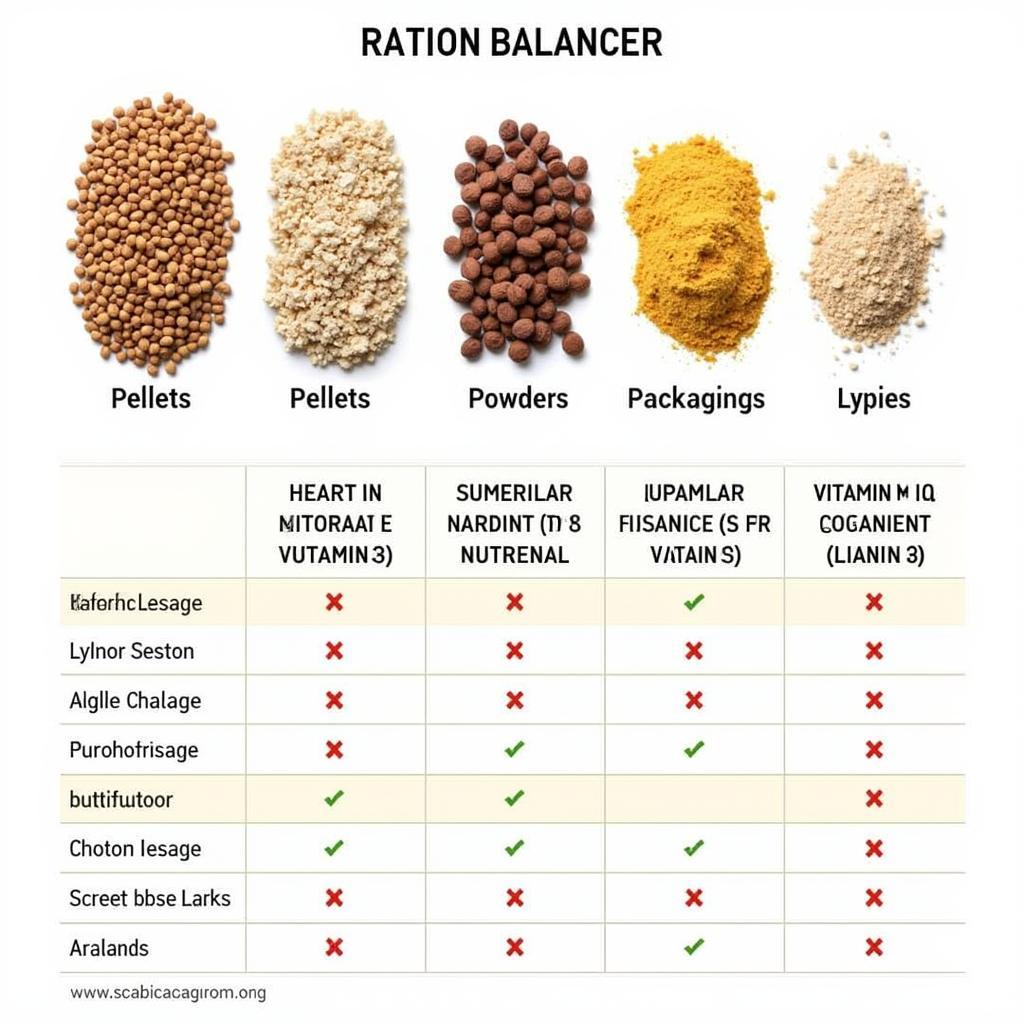Ration Balancer Feed For Horses is a concentrated source of vitamins, minerals, and amino acids designed to complement a forage-based diet. It ensures your horse receives essential nutrients often lacking in hay or pasture alone, promoting optimal health and performance. Learn more about the benefits and how to choose the right ration balancer for your equine companion.
Understanding the Need for a Ration Balancer
Horses require a balanced diet to thrive. While forage provides the bulk of their nutritional needs, it can be deficient in certain key nutrients, especially when pasture quality is poor or hay is mature. This is where a ration balancer comes into play. These feeds are low in calories and starch, making them suitable for easy keepers and those prone to metabolic issues. They provide the necessary vitamins, minerals, and amino acids to fill nutritional gaps, ensuring your horse receives a complete and balanced diet. For instance, a horse consuming primarily mature hay might benefit from a ration balancer horse to ensure they are receiving adequate levels of copper, zinc, and other trace minerals. Shortly after introducing a ration balancer, many owners notice improvements in coat condition, hoof health, and overall vitality. You can read more about why adding things like barley can also help with a horse’s diet on our page about barley for horses.
When is a Ration Balancer Necessary?
A ration balancer is particularly beneficial in several situations:
- Forage-based diets: When hay or pasture is the primary feed source.
- Picky eaters: For horses that consume limited amounts of feed.
- Easy keepers: To provide essential nutrients without excess calories.
- Growing horses: To support proper bone and muscle development.
- Breeding mares and stallions: To meet the increased nutritional demands of reproduction.
- Performance horses: To ensure adequate nutrient intake for optimal athleticism.
Choosing the Right Ration Balancer Feed for Horses
Selecting the correct ration balancer involves considering your horse’s individual needs. Factors like age, activity level, and overall health play a crucial role. Consulting with an equine nutritionist or veterinarian can provide personalized recommendations based on your horse’s specific requirements.
Key Considerations:
- Nutrient Profile: Look for a balancer that addresses any deficiencies in your horse’s current diet.
- Calorie Content: Choose a low-calorie option for easy keepers.
- Ingredients: Opt for high-quality ingredients and avoid unnecessary fillers.
- Palatability: Ensure your horse finds the balancer appealing.
- Feeding Rate: Follow the manufacturer’s instructions carefully. A ration balancer for horses is designed to be fed in small quantities.
 Comparing Different Ration Balancer Feeds for Horses
Comparing Different Ration Balancer Feeds for Horses
Incorporating a Ration Balancer into Your Horse’s Diet
Introducing a ration balancer gradually is key to avoiding digestive upset. Start by adding a small amount to the horse’s current feed and slowly increase the quantity over several days until the recommended feeding rate is reached. Always provide fresh, clean water alongside the ration balancer. Furthermore, regular monitoring of your horse’s weight and condition will help you adjust the feeding rate as needed. Sometimes, horses exhibit strange dietary habits, like eating soil, which can indicate a mineral deficiency. Learn more about this behavior on our page why do horses eat soil.
Tips for Success:
- Mix with other feed: If your horse is hesitant to try the balancer on its own.
- Divide into multiple meals: For better nutrient absorption.
- Monitor manure consistency: To ensure proper digestion.
- Adjust feeding rate as needed: Based on your horse’s individual response.
The Benefits of a Balanced Diet
Feeding a ration balancer offers numerous benefits for your horse’s health and well-being, including:
- Improved coat condition: A shiny, healthy coat is often a sign of good nutrition.
- Stronger hooves: Essential nutrients support hoof growth and integrity.
- Increased energy levels: A balanced diet provides the fuel for optimal performance.
- Enhanced immune function: Proper nutrition strengthens the immune system.
- Better overall health: A balanced diet is the foundation for a long and healthy life.
- Improved reproductive efficiency: For breeding mares and stallions.
“A quality ration balancer is an investment in your horse’s health,” says Dr. Emily Carter, DVM, Equine Nutrition Specialist. “It’s a simple and effective way to ensure they’re receiving all the nutrients they need to thrive.” Another expert, Dr. Sarah Mitchell, PhD, Equine Nutritionist, adds, “Don’t underestimate the importance of a balanced diet. It’s the cornerstone of overall wellness for your equine partner.” Understanding your horse’s nutritional needs is especially crucial if you are considering alternative grains like barley. For further information on using barley as horse feed, please visit our dedicated page on barley grain for horses.
 Healthy Horse with Shiny Coat after Using Ration Balancer
Healthy Horse with Shiny Coat after Using Ration Balancer
Conclusion
Ration balancer feed for horses is a valuable tool for providing essential nutrients and supporting overall health and performance. By carefully choosing a balancer that meets your horse’s individual needs and incorporating it correctly into their diet, you can contribute significantly to their well-being. Understanding the importance of a ration balancer is vital for every horse owner. For more specific information on balancers and other feed options, check out our comprehensive guide on balancer for horses.
FAQ
- What is the difference between a ration balancer and a vitamin/mineral supplement?
- Can I feed a ration balancer to my overweight horse?
- How much ration balancer should I feed my horse?
- What are the signs of a nutritional deficiency in horses?
- Can I feed a ration balancer alongside other supplements?
- What is the best way to store a ration balancer?
- How do I transition my horse to a new ration balancer?
Need assistance? Contact us at Phone: 0772127271, Email: [email protected], or visit us at QGM2+WX2, Vị Trung, Vị Thuỷ, Hậu Giang, Việt Nam. We have a 24/7 customer service team available to help.